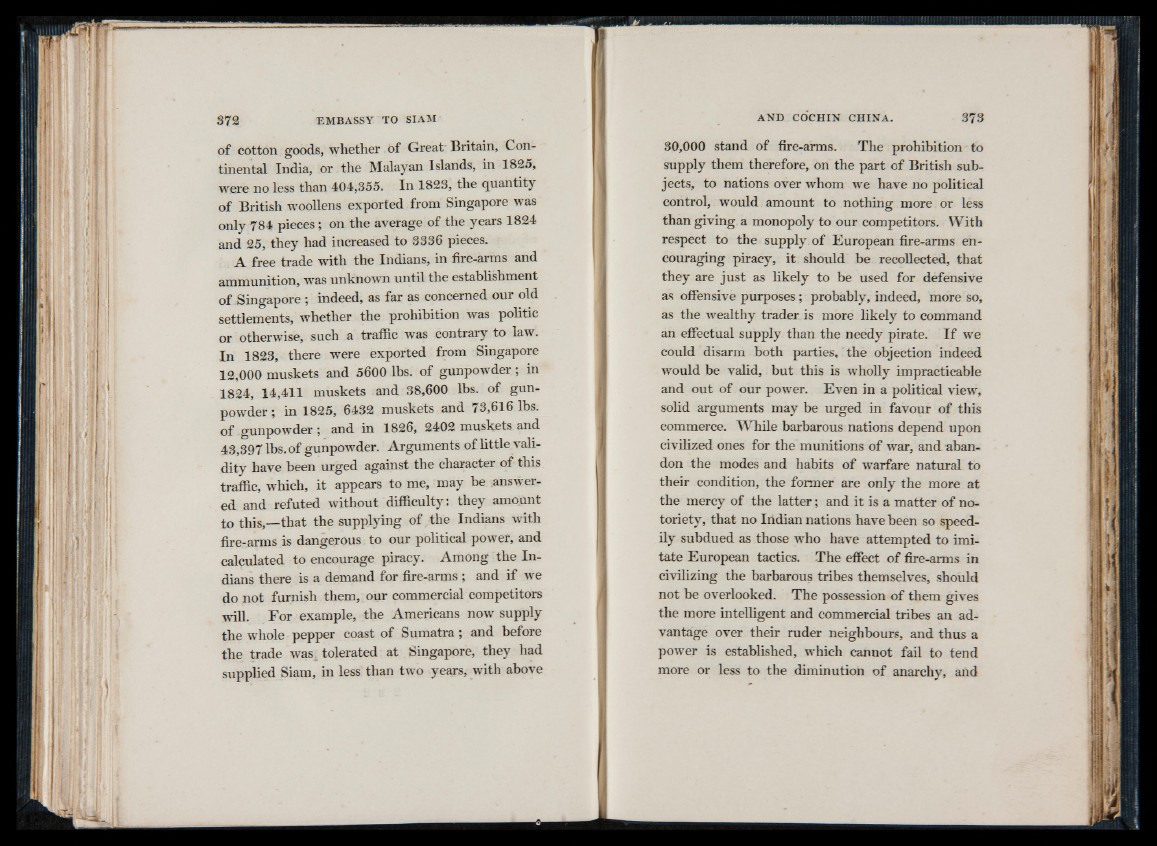
of cotton goods, whether of Great Britain, Continental
India, or the Malayan Islands, in 1825,
were no less than 404,355. In 1823, the quantity
of British woollens exported from Singapore was
only 784 pieces ; on the average of the years 1824
and 25, they had increased to 3336 pieces.
A free trade with the Indians, in fire-arms and
ammunition, was unknown until the establishment
of Singapore ; indeed, as far as concerned our old
settlements, whether the prohibition was politic
or otherwise, such a traffic was contrary to law.
In 1823, there were exported from Singapore
12,000 muskets and 5600 lbs. of gunpowder ; in
1824, 14,411 muskets and 38,600 lbs. of gunpowder
; in 1825, 6432 muskets and 73,616 lbs.
of gunpowder ; and in 1826, 2402 muskets and
43,397 lbs. of gunpowder. Arguments of little validity
have been urged against the character of this
traffic, which, it appears to me, may be answered
and refuted without difficulty: they amount
to this,—that the supplying of the Indians with
fire-arms is dangerous to our political power, and
calculated to encourage piracy. Among the In dians
there is a demand for fire-arms ; and if we
do not furnish them, our commercial competitors
will. For example, the Americans now supply
the whole pepper coast of Sumatra ; and before
the trade was, tolerated at Singapore, they had
supplied Siam, in less than two years, with above
30,000 stand of fire-arms. The prohibition to
supply them therefore, on the part of British subjects,
to nations over whom we have no political
control, would amount to nothing more or less
than giving a monopoly to our competitors. With
respect to the supply of European fire-arms encouraging
piracy, it should be recollected, that
they are just as likely to be used for defensive
as offensive purposes; probably, indeed, more so,
as the wealthy trader is more likely to command
an effectual supply than the needy pirate. I f we
could disarm both parties, the objection indeed
would be valid, but this is wholly impracticable
and out of our power. Even in a political view,
solid arguments may be urged in favour of this
commerce. While barbarous nations depend upon
civilized ones for the munitions of war, and abandon
the modes and habits of warfare natural to
their condition, the former are only the more at
the mercy of the latter; and it is a matter of notoriety,
that no Indian nations have been so speedily
subdued as those who have attempted to imitate
European tactics. The effect of fire-arms in
civilizing the barbarous tribes themselves, should
not be overlooked. The possession of them gives
the more intelligent and commercial tribes an advantage
over their ruder neighbours, and thus a
power is established, which cannot fail to tend
more or less to the diminution of anarchy, and